古典占星宫位(英)
古典占星Morin法则

古典占星Morin法则一、行星力量的运行法则行星力量的实现(一)行星有时会有助于实现所落宫位代表的具体事件,比如太阳落十宫,能带来事业的成功,显赫的名声和各种荣耀。
(二)行星有时也会阻碍所落宫位具体事件的实现,如土星落二宫往往代表了财富的匮乏。
(三)行星有时也会给予保护的能量,如木星落十二宫,则隐藏的敌人无法伤害到你。
(四)行星有时也会先给予,再夺走,如土星落五宫,可能有子嗣,但也预示着可能会夭折。
(五)行星也是幸运和不幸的源泉,如火星落八宫往往意味着不幸,横死,而金星落二宫,则代表富裕,幸运。
行星在占星中有着至关重要的地位,未来会发生什么,不会发生什么,以及相应的原因,这一切,都可以从通过仔细分析星盘中的行星来得到信息。
星盘本身,并不会造成某一具体事件或特质。
同样的,十二个宫位,也不会是相应具体事件的起因。
然而通过影响宫内的行星和星座,它们间接的产生影响。
具体来说,判断行星的影响力可以如下:1.行星的本质是否和相关事件有联系,或代表相关的事件宫位代表了人生可能发生的各个方面,而宫内的行星,来具体实现各宫位所代表的事件,或好或坏。
一个宫位里面的行星,或者此宫位的主宰星(ruler)预示了可能实现(或阻碍实现)的事件。
但是具体会不会发生,要观察行星(主宰星)的本质的装态(essential nature,之后简称本态),和宫位代表事件的相似度(analogy,之后简称相似)和行星状态(cosmic state,之后简称状态)。
这些因素,同时影响事件的质和量。
2.预示着相关事件的实现3.如果实现,实现的深度和广度如何4.揭示了事件实现的原因5.揭示了阻碍事件实现的原因6.揭示了造成的损失的原因7.把它所实现的事件,转化为对盘主本身幸福或不幸的一种起因二、行星的论断行星的状态和论断行星会被各种因素影响,如所处的星座,和其他行星形成的相位,但无论如何,一颗行星的本征态始终是它最重要的特质。
火星永远是火星,哪怕他落在金牛,处于十二宫,和水星三分相位,他仍然是一颗战斗的行星,绝不会变成金星或者土星。
古典占星学习宫位篇
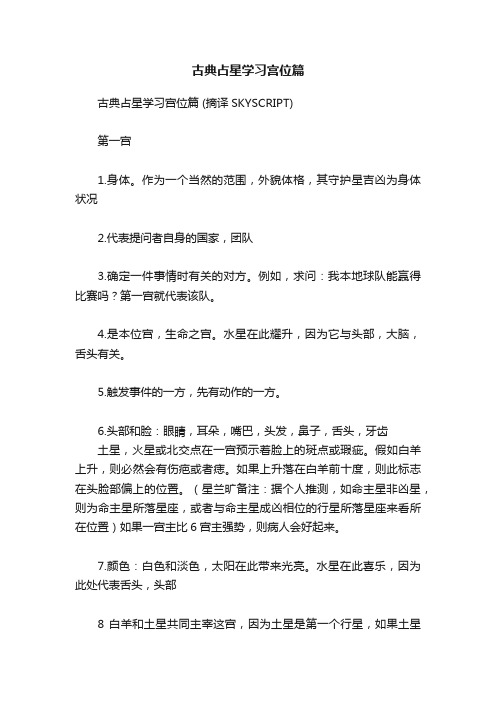
古典占星学习宫位篇古典占星学习宫位篇 (摘译SKYSCRIPT)第一宫1.身体。
作为一个当然的范围,外貌体格,其守护星吉凶为身体状况2.代表提问者自身的国家,团队3.确定一件事情时有关的对方。
例如,求问:我本地球队能赢得比赛吗?第一宫就代表该队。
4.是本位宫,生命之宫。
水星在此耀升,因为它与头部,大脑,舌头有关。
5.触发事件的一方,先有动作的一方。
6.头部和脸:眼睛,耳朵,嘴巴,头发,鼻子,舌头,牙齿土星,火星或北交点在一宫预示着脸上的斑点或瑕疵。
假如白羊上升,则必然会有伤疤或者痣。
如果上升落在白羊前十度,则此标志在头脸部偏上的位置。
(星兰旷备注:据个人推测,如命主星非凶星,则为命主星所落星座,或者与命主星成凶相位的行星所落星座来看所在位置)如果一宫主比6宫主强势,则病人会好起来。
7.颜色:白色和淡色,太阳在此带来光亮。
水星在此喜乐,因为此处代表舌头,头部8 白羊和土星共同主宰这宫,因为土星是第一个行星,如果土星庙旺而且和木,金,日或曰有好相位,则身体健康,长寿。
第二宫1.金钱和动产。
借给别人的钱,别人的支持2。
5宫为父亲的金钱状况;8宫位配偶和敌人的金钱和拥护者;11宫为当权者的拥护者或者事业所得财富3。
潜在的健康问题或是贫困。
随后宫。
4.如果二宫主非吉相或者没有8宫主强势,那么可能会因为他人而损失金钱。
5.象征喉咙和脖子到肩膀的这一段位置6.颜色:绿色7.阴性宫,夜第三宫1 兄弟姐妹,父母以外的亲戚,邻居,以及居住地周边环境,还有经常往复的从某地移动到另外的地方。
2 所有种类的交流,包括信件,谣言,报告,信息,信使,通讯以及报纸,杂志,电话,邮政服务,还有契约及合同,谈话和辩论,语言和自我表达。
3 短距离的旅行,定义是最多一两天的。
海外旅行一律算在九宫,不管距离远近。
教育也不属于此,而是第九宫关于知识的。
4.如果3宫主受刑冲或陷落,则合约或者文件容易出问题,同时也象征着谣言和拜访者。
如果有凶星在3宫,则有一位不受欢迎的访客。
占星基础教程(七):深度解析十二宫位

占星基础教程(七):深度解析十二宫位十二宫位代表我们人生的12个面向,生活的12个领域,宫位的组合就是我们的命运,古典占星更加重视宫位。
天空原本是没有宫位的,宫位是后天的人为概念,因此各家各派,有很多不同宫位制,不同的宫位制采用的计算方法是不一样的,宫位制的分宫方法大体可以分为等分法和不等分法。
关于宫位制,我这边的经验用的最多的是整宫制whole和普拉西德Placudus,这2个是最常用,也是最流行的,大家重点掌握这2个就可以,其他的宫位制就不作更多介绍了,大家有兴趣可以用排盘软件一个个去试一下,其实还蛮好玩的。
整宫制是古希腊流传下来的一种宫位制,优点是简洁、高效,不会出现宫位劫夺这样的情况,用整宫制配合古典占星的一些技法,论断起来非常的准,所以推荐大家看本命用整宫制。
看推运呢我推荐Placidus 结合整宫,看合盘就用Placidus,这是我这边的经验哈,大家也可以总结自己的经验。
宫位制大家可以在排盘软件上选择的,一般个人偏好设定里都可以选择设定的,我们重点来讲一下宫位的分类。
最重要的宫位分类法是三分法:角宫:也叫基本宫,1宫、4宫、7宫、10宫续宫:也叫固定宫,2宫、5宫、8宫、11宫果宫:也叫变动宫,3宫、6宫、9宫、12宫1.角宫,1,4,7,10,大家可以看到角宫就是星盘的4个角,四轴就是这四个宫的宫头,就是最世俗的4个领域,代表的是社会面影响力。
如果一个人的发光体和其他大部分行星落入角宫,那么这个人在世俗领域是容易获得更多机会的,能够轻松获得更多的支持,在社会面更容易形成影响力。
2.续宫,2,5,8,11,代表的是物质面的影响力,如果一个人的发光体和其他大部分行星落入续宫,那么这个人在物质面是更有影响力的,更容易获得资源,名气,人脉,但是缺乏社会级的影响力。
3.果宫,3,6,9,12,代表的是精神面影响力,如果一个人的发光体和其他大部分行星落入果宫,那么这个人在精神面是有非凡影响力的,更容易获得智慧,获得真理,但是缺乏社会面和物质面的影响力,更注重内在发展。
古典占星

The first column of the table indicates the signs of the zodiac.第一列是黄道十二宫的各个星座The second column shows the traditional rulers of the signs. It is headed 'house' because ancient terminology referred to the signs that the planets ruled as being their natural 'houses' or 'homes'.第二列是十二星座传统的守护星。
行星落入这些星座就好像回到家一样(也就是所说的庙)Apart from the Sun and Moon, each of the planets rules one sign by diurnal expression_r (D) and one by nocturnal expression_r (N). Hence Mars rules both Aries and Scorpio, but in Aries, its diurnal rulership, its energies are expressed more openly and directly; in Scorpio (its nocturnal rulership), its energies are more introverted and unconsciously driven. Diurnal simply means 'of the nature of the day'; nocturnal, 'of the nature of the night'. The terms 'diurnal and nocturnal' are synonymous with 'masculine and feminine', 'yin and yang', 'extrovert and introvert'. Diurnal energy usually gives a more spontaneous reaction where inner drives are consciously expressed and clearly apparent. Nocturnal energy is usually more reflective and operates at a deeper level of consciousness.除了月亮和太阳以外,每个星座的守护星体都分为两种。
占星学宫位浅淡

占星学宫位浅淡beautybeast占星学,故名思义,就是以天上的星星做为一种工具,而研究事理的学问,而在占星学中,又以用来分析个人性格的心理占星学最为人知,所以在解释占星学的工具时,就常以心理占星学的内容作为一个浅论的对象;占星学对个人的基本分析大部分是基於一个人的出生时间、地点而为,也就是以一个人出生当时、当地星体的状态来代表一个人,据之而分析。
在占星学中,主要的分析基於星体所落入的星座和宫位来判断,再加上星体间相对位置的分析,就可以大致地分析一个人天生的性格,由於市面上讨论星体落入星座的书藉也有不少,所以这里就以占星学上的宫位作一个概括性的介绍。
所谓的宫位,是依照一个人出生的时、地不同,而将天空分成不同的区块,和星座固定依太阳的运行而划分是不同的。
因此,就算有两个人同一时刻出生,也会因为星体在宫位的分配不同,而有著不同的表现。
现在占星学上所用的宫位制,大致可分为两种(等宫制和四分仪制),但是相同的都把天空分成十二个区间,也就是十二个宫位,而且在宫位的使用和解释上,也是相近的,所以,以下就只对十二个宫位的一些思考作一种简单的描述,而不去论宫位制的不同。
在个人的出生图中,不同的宫位是代表一个人不同的生活领域,但也同时反映出各个不同的心理面向,在现代的心理占星学中,不但把传统占星学的说法重新解释,更利用了不少新的心理学知识来所为论述。
★十二宫的意义行星是演员;星座是演员的表现;而宫位则是该角色所投入的情景•十二宫代表人生不同的活动领域,而於个别『後天宫』出现的行星则强调了某些意义。
由於行星只有十个,所以某些『後天宫』会没有行星出现。
但这不代表那个『後天宫』空洞无用,因其他因素如感应点和月球南北交点等也可能会影响到『後天宫』的显性意义。
同时,宫位所落星座的主宰星,也影响了宫位的表现。
★占星学上的宫位浅论•在占星学中,主要的分析基於星体所落入的星座和宫位来判断,再加上星体间相对位置的分析,就可以大致地分析一个人天生的性格,这里就以占星学上的宫位作一个概括性的介绍。
古典占星之宫位问卜方法
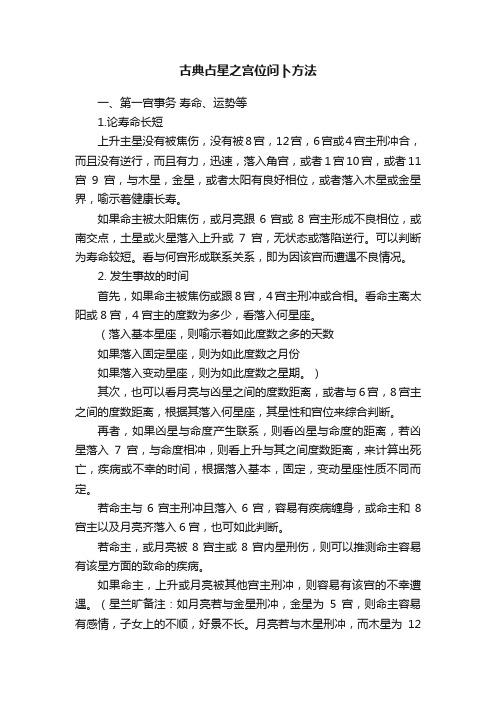
古典占星之宫位问卜方法一、第一宫事务寿命、运势等1.论寿命长短上升主星没有被焦伤,没有被8宫,12宫,6宫或4宫主刑冲合,而且没有逆行,而且有力,迅速,落入角宫,或者1宫10宫,或者11宫9宫,与木星,金星,或者太阳有良好相位,或者落入木星或金星界,喻示着健康长寿。
如果命主被太阳焦伤,或月亮跟6宫或8宫主形成不良相位,或南交点,土星或火星落入上升或7宫,无状态或落陷逆行。
可以判断为寿命较短。
看与何宫形成联系关系,即为因该宫而遭遇不良情况。
2. 发生事故的时间首先,如果命主被焦伤或跟8宫,4宫主刑冲或合相。
看命主离太阳或8宫,4宫主的度数为多少,看落入何星座。
(落入基本星座,则喻示着如此度数之多的天数如果落入固定星座,则为如此度数之月份如果落入变动星座,则为如此度数之星期。
)其次,也可以看月亮与凶星之间的度数距离,或者与6宫,8宫主之间的度数距离,根据其落入何星座,其星性和宫位来综合判断。
再者,如果凶星与命度产生联系,则看凶星与命度的距离,若凶星落入7宫,与命度相冲,则看上升与其之间度数距离,来计算出死亡,疾病或不幸的时间,根据落入基本,固定,变动星座性质不同而定。
若命主与6宫主刑冲且落入6宫,容易有疾病缠身,或命主和8宫主以及月亮齐落入6宫,也可如此判断。
若命主,或月亮被8宫主或8宫内星刑伤,则可以推测命主容易有该星方面的致命的疾病。
如果命主,上升或月亮被其他宫主刑冲,则容易有该宫的不幸遭遇。
(星兰旷备注:如月亮若与金星刑冲,金星为5宫,则命主容易有感情,子女上的不顺,好景不长。
月亮若与木星刑冲,而木星为12宫主,也可推测命主小人多等等)3. 命主哪一段生活最美好首先判断哪一区间的吉星最多,如落入金星,木星,月亮,福点的两个或两个以上。
如果月亮或福点,没有焦伤,也没有不良相位,就选择其所在区间。
如果木星,金星为8宫,12宫或者6宫主时,则不选择其所在区间为目标区间,另选取福点,月亮和命主为判断,如果火星或土星是命主或2宫,10宫,11宫主(星性良好),也可判断为吉。
占星术语中英对照

占星术语中英对照占星术是一门古老的学科,通过研究天体运行轨迹和它们在人类生活中的影响来预测未来的命运和性格特点。
在占星术中,有许多专业术语,下面将介绍一些常见的占星术语及其中英对照。
1. 星座 (Zodiac Sign)星座是以黄道带为基础的12个区域,代表了太阳在出生时所在的位置。
每个星座都有自己的特点和性格特征。
2. 天体 (Celestial Body)天体是指太阳、月亮、行星、恒星和其他在天空中运行的天体。
它们在占星术中扮演着重要的角色,影响着个人的性格和命运。
3. 升星 (Ascendant)升星是指在出生时东方地平线上升起的星座。
它代表了个人的外在形象和个性特征。
4. 太阳星座 (Sun Sign)太阳星座是指太阳在黄道带上的位置,代表了个人的核心特质和个性。
5. 月亮星座 (Moon Sign)月亮星座是指月亮在黄道带上的位置,代表了个人的情绪和内在需求。
6. 占星图 (Natal Chart)占星图是根据出生日期、时间和地点绘制的天体位置图表。
通过分析占星图,可以了解个人的性格特点和命运走势。
7. 宫位 (House)宫位是占星图中的12个区域,每个宫位代表了不同的生活领域,如个人形象、家庭、事业等。
8. 相位 (Aspect)相位是指天体之间的角度关系。
不同的相位代表了不同的能量和影响,可以用来解读个人的关系和事件发展。
9. 逆行 (Retrograde)逆行是指行星在天空中看起来向后运动。
逆行期间,行星的能量会变得更加内省和反思,可能会带来一些挑战和机遇。
10. 预测 (Prediction)预测是占星术的核心内容之一,通过分析天体位置和相位,预测未来的命运和事件发展。
11. 大师 (Astrologer)大师是熟练掌握占星术的专业人士,能够通过占星图和其他工具为个人提供准确的预测和指导。
12. 占星学派 (Astrological School)占星学派是指不同的占星术理论和流派,如西方占星学、中国占星学等。
古典占星财富情况财富格局判断
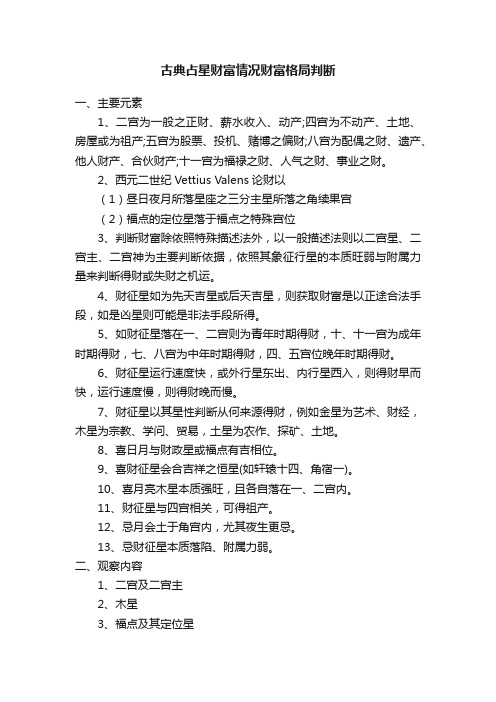
古典占星财富情况财富格局判断一、主要元素1、二宫为一般之正财、薪水收入、动产;四宫为不动产、土地、房屋或为祖产;五宫为股票、投机、赌博之偏财;八宫为配偶之财、遗产、他人财产、合伙财产;十一宫为福禄之财、人气之财、事业之财。
2、西元二世纪Vettius Valens论财以(1)昼日夜月所落星座之三分主星所落之角续果宫(2)福点的定位星落于福点之特殊宫位3、判断财富除依照特殊描述法外,以一般描述法则以二宫星、二宫主、二宫神为主要判断依据,依照其象征行星的本质旺弱与附属力量来判断得财或失财之机运。
4、财征星如为先天吉星或后天吉星,则获取财富是以正途合法手段,如是凶星则可能是非法手段所得。
5、如财征星落在一、二宫则为青年时期得财,十、十一宫为成年时期得财,七、八宫为中年时期得财,四、五宫位晚年时期得财。
6、财征星运行速度快,或外行星东出、内行星西入,则得财早而快,运行速度慢,则得财晚而慢。
7、财征星以其星性判断从何来源得财,例如金星为艺术、财经,木星为宗教、学问、贸易,土星为农作、探矿、土地。
8、喜日月与财政星或福点有吉相位。
9、喜财征星会合吉祥之恒星(如轩辕十四、角宿一)。
10、喜月亮木星本质强旺,且各自落在一、二宫内。
11、财征星与四宫相关,可得祖产。
12、忌月会土于角宫内,尤其夜生更忌。
13、忌财征星本质落陷、附属力弱。
二、观察内容1、二宫及二宫主2、木星3、福点及其定位星4、财富点及其定位星5、1-4有力强旺与命宫或命主吉相6、1-4有力强旺者,前后又有吉星拱夹、日月吉相,广有财禄7、强旺有力之星与福点之强旺主星有力,又有吉星吉相,极为有财。
凶星凶相则贫贱求财不得8、土星与福点吉相,又得木星相助,得父祖遗产、或不谋而得。
9、日或月在阳宫,又在始宫,昼生太阳在地平上,夜生太阴在地平上,有星拱夹或吉星在始宫交角,至富极贵。
10、日月在阴宫,又在果宫,逢凶星凶相或拱夹,则至为贫贱。
11、第一、二等恒星在四角点上或在日、月同度、或在福点同度,主大富大贵。
占星学中的星座宫位是什么意思?

占星学中的星座宫位是什么意思?星座宫位就像黄岛十二星座有十二个星体一样,宫位一样也拥有十二个。
每个宫位有代表着自己不同的特殊的意义,反映出来的问题也是不同的,而且分别在占星学上与十二个星座一一对应。
宫位指的是,将地平线上下方的天空——即天文学家所称的天球(celestial-sphere)分成12部分。
首先以地平线划分第一宫和第七宫的宫头,或说上升点和下降点——它们对应着每天日出和日落的时间。
然后是连接中天和下中天的子午线——代表了一天的正午和午夜。
其他宫位是在这两条轴线之间继续细分而得。
可以将宫位圈想象成一个时钟或日晷。
事实上星盘可以同时看成一个时钟和一个日历,因为星盘的外圈(黄道十二星座)对应的是季节的日历。
在占星学中,宫位代表能量显现的地方,所以宫位可以显示背景、领域和情境。
第一宫/上升点:显示出你的外貌、人格、个性、体形以及容貌特质,外在形象,易于鉴别的特点,肢体语言,基本外在人格倾向,自我意识和自我认知,“那就是我”的认同感,也反映出早期环境造就的外在个性特点。
第二宫:体现了所有权,拥有财产,自我价值,一个人在生命中所重视的事物,富足感,金钱以及金钱观,物质世界,“那是我的!”“值不值得?”“我要什么?”“我想拥有什么?”第三宫:代表一般意义上的交流沟通,交流风格以及交流中流露出的心理倾向,一个人进行思考和分析的风格和基本方式(特别与一个人的思维和表达方式有关),部分也受以下因素的影响:兄弟姐妹、姑表亲戚、邻居、邻里关系或地域因素、小学、中学、短途旅行、文章、报纸、媒体、八卦消息、期刊、时事通讯等,是“较低层面的智力表现”、“生命的人行道”,这里是你私人活动的后花园,是你的左邻右舍,是你构建自己的社交圈子的活动场所。
第四宫/下中天:代表家庭,领土,私人空间,“我的地盘”,地产,房屋,归属地,家庭领域,巢穴,安全感,家庭,根基,父母对家庭环境造成的影响,父母扮演的角色,“在午夜时分,你是谁?”你的“午夜自我”,或更加“私密/个人的”自我,你“与环境的关系”。
单词 占星
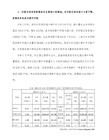
赤纬:declination [坐标] 星体与赤道面的夹角
赤道:equator 地球上位于两极间之距离一半的假想大圆
次级推进:Secondary Direction 将出生图上的星体及基本点位置,以一日代表一年的方式计算其移动,来作某种预测,有时也称作 progressions
处女座:Virgo [星座] 黄道上的第六个星座,在黄经150度起至180度前的区间,太阳约在每年的八月二十一日到九月二十三日通过这个区间;处女座由水星守护,海王星在此为失势位置,金星在此为弱势位置
超个人行星:transpersonal planets 指天王星、海王星和冥王星
春分点:Vernal Equinox 太阳由南向北时通过天球赤道的点,同时也是牡羊座零度
回归黄道:Tropical Zodiac 以春分点为准画出黄道,即一般占星学上称之黄道带
回归:returns 行星回到其出生图上相同的位置
海王星:Neptune [行星] 由太阳算起第八颗(>天文学上的)行星,掌管文化、精神生活
分:minute六十分之一度的区间
分宫制:House division 划分宫位的方法
分点星座:equinox signs指牡羊座及天秤座
发光体:luminaries(lights) 在占星学上常指太阳和月亮
福点:Part of Fortune (幸运点) [阿拉伯点] 在日间出生者:上升的黄经加上月亮的黄经,再减掉太阳的黄经;在夜间出生者:上升的黄经加上太阳的黄经,再减掉月亮的黄经
固定宫:succedent houses 包括第二、五、八、十一宫
占星术宫位)

占星术宫位第一宫关联星座:白羊座关联行星:火星——对个性的原始追求和公众形象第一宫代表着自我意识、脾气和天性。
它常常被描述为通向世界的“前门”,因为它掌握着开启我们对人生和他人看法的钥匙。
我们通过第一宫向周围的环境表达并释放内心的需要和能量。
上升点上的星座影响着我们对世界的看法,同时也影响着世界如何看待我们。
特性上升点好比是一个“persona ”(拉丁文,意为演员所带的面具),即我们最早在世界这个舞台上所带的面具。
只有在安全和放松的环境下,我们才会摘掉这个面具,让别人看到真正的我们。
有时我们会因为别人认可我们的面具而压抑真正的自我。
因此,第一宫往往会隐藏那些其他行星赋予我们的个性,尤其是太阳。
第一宫连结着火星和白羊座,它描述我们的个性,并且是我们与世界中间的一个媒介。
在生理学的意义上,第一宫被认为是决定我们外表和活力的因素。
这一宫中的星座和行星暗示着表达自我和发现个性的方法。
如果我们没能发现或发展这些个性,我们就不能感受到完整的自我。
这一宫也告诉我们一些关于早期生活的资讯。
因为在年幼时就经历了它所代表的能量,所以我们被打上这一宫中星座和行星的烙印。
无论我们的处境怎样,星位都知道。
当我们逐步发展第一宫中上升点和行星赋予我们的个性时,我们就会更加了解自己和自己同周围的关系。
第一宫也代表着我们对外输出的能量。
这是在与他人交往中我们选择展现的那部分自我。
我们为自己设计了一个面具,并逐渐地认为自己就是这个面具。
从这个意义上讲,第一宫既是我们内心中的自我形象,也是另一个我们用来表现自我的形象。
然而,这个面具并不是一个欺骗的道具,而仅仅是完整的自我中的一部分。
第一宫象征着我们同世界交流的那部分自我——即我们在众人前所选择的那张面具。
第二宫关联星座:金牛座关联行星:金星——我们同财富和物质世界的关系第二宫向我们展示了我们如何衡量自己的价值,以及我们希望从自己的才能中想要获得的东西。
它代表内心中对于金钱和物质财富的需要。
占星学常用英语词汇.
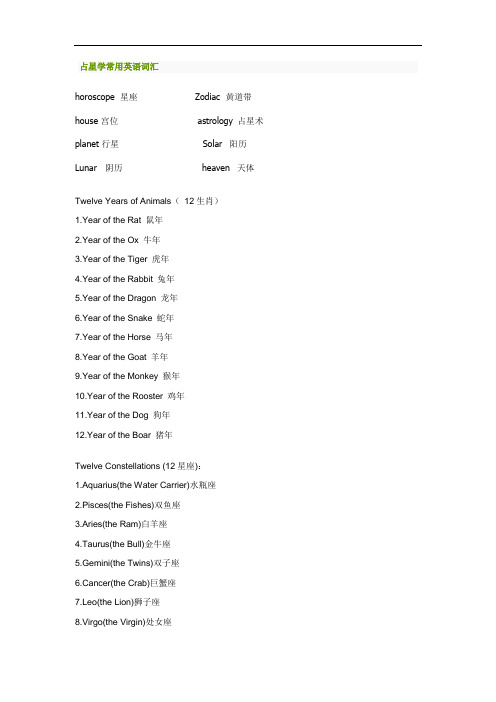
占星学常用英语词汇horoscope 星座Zodiac 黄道带house 宫位astrology 占星术planet 行星Solar 阳历Lunar 阴历heaven 天体Twelve Years of Animals(12生肖)1.Year of the Rat 鼠年2.Year of the Ox 牛年3.Year of the Tiger 虎年4.Year of the Rabbit 兔年5.Year of the Dragon 龙年6.Year of the Snake 蛇年7.Year of the Horse 马年8.Year of the Goat 羊年9.Year of the Monkey 猴年10.Year of the Rooster 鸡年11.Year of the Dog 狗年12.Year of the Boar 猪年Twelve Constellations (12星座):1.Aquarius(the Water Carrier)水瓶座2.Pisces(the Fishes)双鱼座3.Aries(the Ram)白羊座4.Taurus(the Bull)金牛座5.Gemini(the Twins)双子座6.Cancer(the Crab)巨蟹座7.Leo(the Lion)狮子座8.Virgo(the Virgin)处女座9.Libra(the Scales)天秤座10.Scorpio(the Scorpion)天蝎座11.Sagittarius(the Archer)射手座12.Capricorn(the Goat)山羊座A 字部abbreviations 缩写在占星学上常用前两(叁)个英文字母来代表一些占星学上会用到的术语,本文中以()标示者即是缩写。
acceleration 时距加速值用来修正平太阳时与恒星时的差距,在计算宫位及基本点时必须要用到affliction 受克星体处於不利的位置;通常指与其他星体或基本点成对相或四分相,有时也指星体落入对其不利的星座或宫位Agricultural Astrology 农业占星学研究星象与农业活动的关系air signs 风象星座包括双子座、天秤座、水瓶座;在个人占星学中与思考性、自由、冷静的特质有关American Federation of Astrologer,Inc. (AFA)美国占星家协会美国最大的占星家联盟,兼营出版及教育事业angles 基本点(指上升、下降、天顶和天底四个点)angular houses 本位宫(包括第一、四、七、十宫)angular planets(angularity)合轴星(与基本点合相的行星,有时也指在一、四、七、十宫中的星)applying aspect 入相位(两行星正接近形成准确相位视角的位置)Aquarian Age 水瓶座时代十二个大月之一,是以春分点移位经过(天文学上的)水瓶座的一段时期Aquarius 水瓶座黄道上的第十一个星座,在黄经300度起到330 度前的区间,太阳约在每年的一月二十日到二月十九日通过这个区间;水瓶座由天王星守护,太阳在此为失势位置,水星在此为强势位置。
占星十二宫代表

第一宫询问者,和询问者无相关的失踪者,自我,健康,寿命,询问者的身体特征,身体,头,外观,性情,人格,新生儿,起点,意外事情,车辆的状况,新计画,个人兴趣,主动的行动,水星的愉悦(ThejoyofMercury)第二宫财产,资源,可移动的货物,失物,金钱,收入,价值,个人财富,领地,潜在的财产或贫困第三宫通讯,新闻,兄弟姊妹,邻居,邻近,基本教育,亲密的家族,堂兄弟姊妹,表兄弟姊妹,访客,短程旅途,车辆,道路,学习,著作,文件,信件,老师,邮车,记者,谣言,闲话,月亮的愉悦(ThejoyoftheMoon)第四宫父亲,家,家庭,家务事,事情的结局,失而复得的财产,埋藏的宝物,基础,安全,防护,土地,不动产,建筑物,房子,农场,井,矿藏,地球的资源,祖先,晚年,长者,墓穴第五宫小孩,有创意的自我表现,嗜好,投机,赌博,乐透,股票,冒险,令人兴奋的事,比赛,选举,娱乐,快乐,(享乐的)性,爱情事物,罗曼蒂克,浪漫情调,怀孕,乐趣,宴席,教育,询问者的代理人(agent),大使,代表,父亲的动产,金星的愉悦(ThejoyofVenus) 第六宫疾病,患病,冗长乏味的事情,苦工,单调的工作,复杂的工作,同事,宠物,小动物(比羊还小的动物),用人,公务员,雇员,服务,器具,设备,姑姑或叔父,房客,承租人,每日的工作,食物,卫生,气氛控制,调整某事物的功能,辛苦,康复,治疗物,火星的愉悦(ThejoyofMars)第七宫同伴,配偶,昏配,重要的对象,询问者想问的人但是没有适当的所属宫位,对手,竞争者,敌对,询问者所咨询的(卜卦)占星学家,个人的咨询对象,小偷,逃跑者,逃犯,兄弟姊妹的小孩,婚姻,合伙关系,离婚,诉讼(尤指非刑事案件),搬家的目的地,法律契约合同,公开交易第八宫死亡,(生殖的)性,外科手术,伤害,转换,变化,重生,改建,其它人的钱财,其它人的动产,心理分析(学),神秘学,渗透,洞察力,追根究底的,拒绝,税金,负债,抵押,借款,询问者的金钱,保险,意志力,决心,他人的礼物,遗产,已故者的地产,研究调查,个人的无意识第九宫长途旅行,外国(人),姻亲,高等教育,授课,演讲,信仰,牧师,神职人员,教堂,哲学,人生观,预言,预测,卜卦占星学,出版(业),广播,广告,职业课程,保险理算员,航行,法律上正当的仪式,法庭,律师,法律,婚姻,科学,系统化有组织的想法,梦,幻觉,法律诉讼,研究,太阳的愉悦(ThejoyoftheSun)第十宫母亲,官方,上级,老板,政府,组织,职业,专业,雇主,君主,统治者,总统,法官,经理,提升,晋升,名声,等级,地位,荣誉,成功,成就,名望,公务的,重要工作,地位第十一宫朋友,团体,社团,社交,商议,人际关系,立法委员,希望,野心,安逸,慰问,救济,赞扬,信任,职业收入,权力资源,母亲的动产,人道主义,事业上的客户第十二宫隔绝,毁灭,缺点,收容,限制,幽禁,监牢,奴隶,犯人,俘虏,限制,害怕,处罚,自我毁灭,集体无意识,守寡,制度,撤退,秘密事物,秘密交易,诗,麻醉药,酒精,病人,姨妈或舅父,悲痛,隐藏的危险,失望,自杀,谋杀,暗杀,慈善,博爱,大型动物(比羊大),土星的愉悦(ThejoyofSaturn)。
宫位

第六宮
傳統地這一宮掌管工作,健康及服務性,但正如處女,這宮的守護星座,第六宮強的人不是只想不斷的忙碌著。他希望能提供一些必要的服務。他只會於覺得被需要/忙碌/有用感到快樂。正因如此,他不介意照看計劃的細節。他知道這些細節對於一個成功計劃的重要性---同時他知道沒人會願意處理這些。或考這便是第六宮掌管細節及未了結的零星問題。
第三宮
這是被雙子座影響的宮,掌管好奇心,概念,記憶及一切形式的溝通,包括我們說話及思考的方式。這宮統治了我們的童年及在我們童年中佔有角色的人,特別是我們的雙親。當一個人有星體落入第三宮時,他永遠不會沒話說,也會像其他雙子一樣多話。但正如雙子,這個人不會實行他們得出的概念,而只聆聽,然後傳播。這賦予第三宮的人模仿的能力。傳統地,這個宮統治了短線旅行,第三宮強的人會喜歡每天也走動,如果只是在住處附近打轉的話。他不會定下來,要麼他們便會感及繼承權。
第九宮
第九宮掌管信任及誠實。它反映我們比較高層的想法,一些理念。很多書會說到第九宮時會關係到宗教。但我的看法是,一些對「神」的態度。因為越來越發現,宗教是一些第十宮的事情(個人覺得這裏之所以說是第十宮的事情涉及到一些宗教管理及推廣的事情,政教的問題。他想說的應該是一些比較理想化的看法會歸第九宮 by eoii)。運作一所教堂,籌款,支薪,收納新教眾等。宗教變成一盤生意。一個第九宮強的人會對各方面有強烈的求知欲。這可以於高等教育(另一個第九宮的事情)去實現或者長途旅行--不論是於身體內或是身體外進行(第八宮掌管夢,第九宮掌管睡覺時的旅程)。這一宮掌管出版,國外的土地或人。(有趣的是傳統占星學會賦予第九宮掌管姻親!!!。--按转宫法,第九宫是第七宫的第三宫,可能代表妻子的兄弟姐妹平辈之类的亲戚 by 思)這宮亦掌管國外交易,司法,法律及高等法庭。請想像一下射手,那你便會明白第九宮擴張的需要。
占星速成之行星落点之宫位和相位
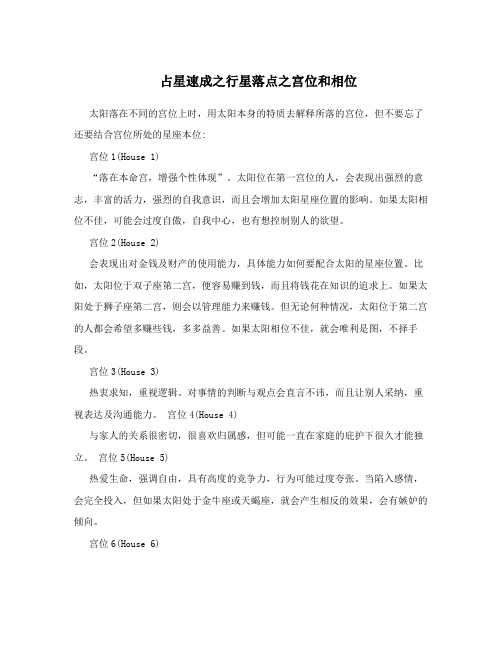
占星速成之行星落点之宫位和相位太阳落在不同的宫位上时,用太阳本身的特质去解释所落的宫位,但不要忘了还要结合宫位所处的星座本位:宫位1(House 1)“落在本命宫,增强个性体现”。
太阳位在第一宫位的人,会表现出强烈的意志,丰富的活力,强烈的自我意识,而且会增加太阳星座位置的影响。
如果太阳相位不佳,可能会过度自傲,自我中心,也有想控制别人的欲望。
宫位2(House 2)会表现出对金钱及财产的使用能力,具体能力如何要配合太阳的星座位置。
比如,太阳位于双子座第二宫,便容易赚到钱,而且将钱花在知识的追求上。
如果太阳处于狮子座第二宫,则会以管理能力来赚钱。
但无论何种情况,太阳位于第二宫的人都会希望多赚些钱,多多益善。
如果太阳相位不佳,就会唯利是图,不择手段。
宫位3(House 3)热衷求知,重视逻辑。
对事情的判断与观点会直言不讳,而且让别人采纳,重视表达及沟通能力。
宫位4(House 4)与家人的关系很密切,很喜欢归属感,但可能一直在家庭的庇护下很久才能独立。
宫位5(House 5)热爱生命,强调自由,具有高度的竞争力,行为可能过度夸张。
当陷入感情,会完全投入,但如果太阳处于金牛座或天蝎座,就会产生相反的效果,会有嫉妒的倾向。
宫位6(House 6)有强盛的工作力与组织力,生活重心在工作上,对自己的成就感到骄傲,意志坚决,积极进取,行事有规律。
如果相位不,会过度挑剔,吹毛求疵。
宫位7(House 7)容易与他人发展亲密的感情,还会有忠实的朋友。
婚姻在你的生命非常重要,如果太阳相,位良会拥有持久的情感。
如果相位不佳,可能会喜爱控制别人或被别人控制。
宫位8(House 8)常谈生死,重视精神生活。
严谨的处事态度,有所失也有所得。
如果相位不,会有麻烦事甚至是非。
而且太阳落在第八宫位的人,还有可能无法被发现和赏识,或者与自己的想象有很大的差距。
宫位9(House 9)有较强的道德观,但可能小心眼。
如果太阳相位不佳,会将自己的道德观点强加给别人,谦逊有礼,但有时也会很伪善。
黄道十二宫

中文名称:黄道十二宫英文名称:zodiacal signs定义:古代巴比伦把整个黄道圈从春分点开始均分为12段,每段均称为宫,各以其所含黄道带星座之名命名。
总称黄道十二宫。
后因岁差关系,黄道十二宫与黄道十二星座不再相应。
星图黄道十二宫(zodiac)一词来自希腊语zodiakos,意思是动物园。
在希腊人眼里,星座是由各种不同的动物形成,这也就是十二个星座名称的由来。
在天文学上,以地球为中心,太阳环绕地球所经过的轨迹称为“黄道”。
黄道宽16度,环绕地球一周为360度,黄道面包括了除冥王星以外所有行星运转的轨道,也包含了星座,恰好约每30度。
范围内各有一个星座,总计为十二个星座,称为“黄道十二宫”。
十二宫相关参数汉语名符号拉丁名所有格缩写面积星数守护星[1]白羊座♈Aries ArietisAri441 50 火星金牛座♉Taurus Tauri Tau 797 125 金星双子座♊GeminiGeminorumGem 514 70 水星巨蟹座♋Cancer Cancri Cnc 506 60 月亮狮子座♌Leo Leonis Leo 947 70 太阳天秤座♎Libra Librae Lib 538 50 金星天蝎座♏Scorpius Scorpii Sco 497 100火星或冥王星人马座♐SagittariusSagittariiSgr 867 115 木星摩羯座♑CapricornusCapricorniCap 414 50 土星水瓶座♒Aquarius Aquarii Aqr 980 90土星或天王星双鱼座♓Pisces Piscium Psc 889 75木星或海王星第一宫「命宫」,又称「上升宫位」,本是白羊座的固定位置。
第一宫代表生命的诞生—「我是」,它显示一个人的性格、言行举止、健康、外貌、体型、以及给予别人的第一印象。
在时势占星学里,第一宫代表「人民宫」。
白羊座中心位置:赤经2时40分,赤纬21度。
紫微斗数富贵格局:英星入庙格详解

紫微斗数富贵格局:英星入庙格详解什么是英星入庙格?紫微斗数中,“格局”指的是某类星在某些宫位,以及某类星与某类星同宫或加会等等情况。
通过这些组合可以显示出命主属于某一类型的命运,或凶或吉、或贫或富、或贵或贱,或吉凶皆有等。
本期,小编要为大家介绍富贵格局中的一种,英星入庙格。
紫微斗数富贵格局:英星入庙格格局所谓“英星入庙格”是指破军星在子宫或者是午宫入庙坐守命宫,三方四正遇禄存、科权禄、左右、魁钺等吉星会照,无煞星冲破,为此格。
紫微命盘中有此格局者,具有冲刺精神,作为力、魄力、主见皆强,性急、果断,也胆于冒险。
但一生变动大,多起落,如遇破格时,较易有投机、涉赌、过度冒险的行径,大起大落。
甲癸年生人上格,主大富或大贵,丁己年生人次之。
丙戌年生人主困,不入此格。
诗曰:“北斗英星最有权,坎离之上福绵绵。
黄金建节趋廊庙,统摄英雄镇四边”。
经云:“子午破军,加官进爵”、“破军子午宫,无煞,甲癸生人,官资清显,位至三公”。
怎样在职场上立足:破军星入命宫者紫微斗数富贵格局:英星入庙格构成杀破狼格局紫微命盘中有“英星入庙”格局时,财帛宫必有七杀星坐守,而官禄宫则有贪狼星坐阵,为典型的杀、破狼结构。
只是这个格局因为贪狼星落入天罗地网宫位,其负面的性格受到非常大的制约,不致大事彰显贪狼星的漫无天际,尚能遵循礼法、司法等等的规范。
而七杀星也能在“体制”之内作最大能量的冲刺作为,这便是“英星入庙”格局的实质精神所在。
七杀星入财帛宫,七杀星在财帛宫英星入庙格:破军在子午入庙坐命最好破军在子午入庙坐命,是最有力的宫位,一生波动较少。
因为破军星五行属水,而子宫属水,午宫属火,故破军在子为“水归大海”,在午为“水火既济”。
相比较而言,破军居午宫社会地位比子宫要高,个性较为急切,作事讲求效率;而破军居子宫的人个性较倔强,也容易流于自以为是。
而以勤勉度及辛劳度来说,子宫破军比午宫也更加辛苦。
贪狼星入官禄宫,贪狼星在官禄宫以上是紫微斗数富贵格局,英星入庙格的介绍,希望大家在学习的过程中,不要死板的认为“成格局的一定好”,或者是“不成格局的一定很垃圾”。
分宫制——精选推荐
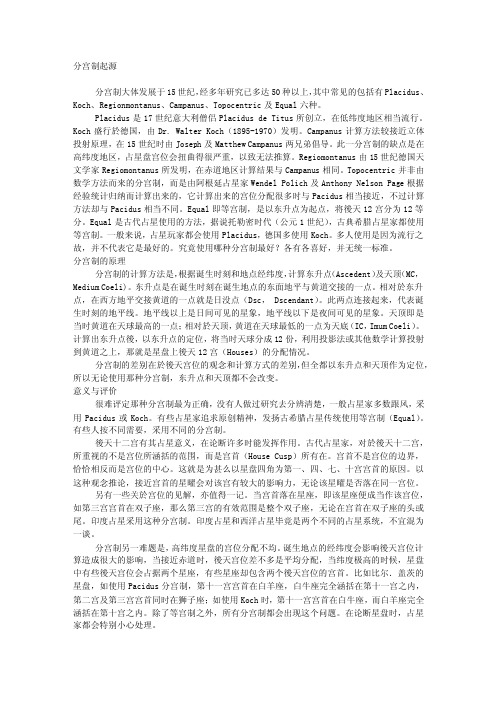
分宫制起源分宫制大体发展于15世纪,经多年研究已多达50种以上,其中常见的包括有Placidus、Koch、Regionmontanus、Campanus、Topocentric及Equal六种。
Placidus是17世纪意大利僧侣Placidus de Titus所创立,在低纬度地区相当流行。
Koch盛行於德国,由Dr. Walter Koch(1895-1970)发明。
Campanus计算方法较接近立体投射原理,在15世纪时由Joseph及Matthew Campanus两兄弟倡导。
此一分宫制的缺点是在高纬度地区,占星盘宫位会扭曲得很严重,以致无法推算。
Regiomontanus由15世纪德国天文学家Regiomontanus所发明,在赤道地区计算结果与Campanus相同。
Topocentric并非由数学方法而来的分宫制,而是由阿根延占星家Wendel Polich及Anthony Nelson Page根据经验统计归纳而计算出来的,它计算出来的宫位分配很多时与Pacidus相当接近,不过计算方法却与Pacidus相当不同。
Equal即等宫制,是以东升点为起点,将後天12宫分为12等分。
Equal是古代占星使用的方法,据说托勒密时代(公元1世纪),古典希腊占星家都使用等宫制。
一般来说,占星玩家都会使用Placidus,德国多使用Koch。
多人使用是因为流行之故,并不代表它是最好的。
究竟使用哪种分宫制最好?各有各喜好,并无统一标准。
分宫制的原理分宫制的计算方法是,根据诞生时刻和地点经纬度,计算东升点(Ascedent)及天顶(MC,Medium Coeli)。
东升点是在诞生时刻在诞生地点的东面地平与黄道交接的一点。
相对於东升点,在西方地平交接黄道的一点就是日没点(Dsc, Dscendant)。
此两点连接起来,代表诞生时刻的地平线。
地平线以上是日间可见的星象,地平线以下是夜间可见的星象。
天顶即是当时黄道在天球最高的一点;相对於天顶,黄道在天球最低的一点为天底(IC,Imum Coeli)。
- 1、下载文档前请自行甄别文档内容的完整性,平台不提供额外的编辑、内容补充、找答案等附加服务。
- 2、"仅部分预览"的文档,不可在线预览部分如存在完整性等问题,可反馈申请退款(可完整预览的文档不适用该条件!)。
- 3、如文档侵犯您的权益,请联系客服反馈,我们会尽快为您处理(人工客服工作时间:9:00-18:30)。
The Houses in Traditional Astrology© Sue Ward 2002. All rights reservedIn any article about house significations it is not enough simply to list them; the foundation needs to be understood first. This paper explains that foundation.To begin with it needs to be said that whatever we now consider astrology’s purpose to be, in order to use its symbolism properly we have to acknowledge and absorb its tradition. Astrology, as we understand it, forms a part of an ancient desire to understand our universe. It is humanity’s attempt to obtain knowledge of the Will of God, or the Divine Plan. There is, naturally, far more to it than that and the briefest glimpse at the Hermetics bears this out. In this search is implied a desire to find order in, what might otherwise seem to be, the chaos of human existence.This order was constructed from an understanding and experience of life that we seem no longer to have and grew out of an holistic philosophy that our current astrological community is trying to recover. That philosophy was entirely based upon and derived from the knowledge of Divine existence. However secular our age becomes, we would do well not to forget that it is from that single point that astrological symbolism has developed. Astrology is the sacred language of Divination: a way to understand the Divine Mind and a way to make connection with that Mind. Since its symbolism is so profound, it seems perilous to meddle with it if we do not understand this fundamental philosophy. Whether or not it is necessary to hold to these principles is another story, but we must be aware them at least.From the foregoing and before entering the subject of the houses proper, we need first to look at a common misconception and one that has brought about misunderstanding and confusion. This is the system of the ‘consignification’ of signs with houses. In this we see the first sign of Aries lined up with the 1st house; the second sign of Taurus with the 2nd house and so on around the circle. From this, modern astrology has extrapolated the notion that Mars must, therefore, rule the 1st house, Venus the 2nd etc. because those planets rule those signs. This causes still further problems when we come tothe signs that have been given one of the new planets as ruler: Scorpio and Pluto, Aquarius and Uranus, and Pisces and Neptune. So, then we have Pluto gaining rulership of the 8th house and absorbing signification from the 8th, for example, death. From the same error we see the 8th house associated with sexual activity because Scorpio rules the sexual organs and is the eighth sign1. We can see the same occurring with the other two new planets. There is a knot of reasons for this misunderstanding of the houses, but its explanation does not fall within the scope of this paper. What this paper demonstrates is that the houses obtain their signification from the Sun’s apparent orbit around the Earth, and need to be understood from that point of view. It is also necessary to understand that the Luminaries are central to all structure, signification and rulerships.Nature Element Aries Hot and dry FireTaurus Cold and dry EarthGemini Hot and moist AirCancer Cold and moist WaterLeo Hot and dry FireVirgo Cold and dry EarthLibra Hot and moist AirScorpio Cold and moist WaterSagittarius Hot and dry FireCapricorn Cold and dry EarthAquarius Hot and moist AirPisces Cold and moist Water1 It is true that in the order of the houses the 8th house is associated with the sexual organs, but that does not mean that the 8th rules sexual activity, any more than the 12th house rules walking because it is associated with the feet.The zodiac is a calendrical device used to measure the Sun’s apparent journey around the heavens. Applied to the northern hemisphere, the Sun’s position in any one of the signs expresses its “temperature” and thus, the season. Each sign has its own “nature”: hot and dry, cold and dry, hot and moist, cold and moist; these temperatures, temperaments or humours tally with the natures of the elements. Thus, Fire is hot and dry, Earth is cold and dry, Air is hot and moist, and Water is cold and moist. Added to this we have four groups of three signs each corresponding to the seasons, as explained below.The Sun’s essential nature is hot and dry, but we know from everyday experience that this changes throughout the year. The zodiacal system explains those changes through the natures of the signs, so that when the Sun is in Aries, Taurus or Gemini it is springtime and the Sun’s nature becomes hot and moist. This is because Spring is a time of great fertility and growth, and heat and moisture correspond with that. When the Sun is in Cancer, Leo or Virgo it is summertime and, as we would expect, the Sun’s fundamental nature, hot and dry, is reinforced. Moving on to Autumn, when the Sun is in Libra, Scorpio or Sagittarius, its nature becomes cold and dry – the opposite of the temperature attributed to the Spring – when fertility ceases. In Winter, the Sun is in Capricorn, Aquarius or Pisces and assumes a cold and moist nature. (The Moon has its own “seasonal” nature through its four phases, expressing similar temperature changes).Sun in Season NatureAries, Taurus, Gemini Spring Hot and moist Cancer, Leo, Virgo Summer Hot and dry Libra, Scorpio, Sagittarius Autumn Cold and dry Capricorn, Aquarius, Pisces Winter Cold and moistConsignification derives from an attempt to seek order in the universe and is connected with the instituting of the tropical zodiac. It is applied to the human body, so that Aries associates with the head, as does the 1st house; Taurus associates with the neck and throat, as does the 2nd house. This continues through to the 12thhouse, Pisces and the feet. Added to this ordering of the signs and houses are the planets, but in quite the reverse order. Saturn is associated with the 1st house, Jupiter with the 2nd, Mars with the 3rd, the Sun with the 4th, Venus with the 5th, Mercury with the 6th, andthe Moon with the 7th and so on, but excluding the new planets. Thisis known as the Chaldean order of the planets referring to distance from the Earth and plainly has little to do with the order of the signs.Sign House Planet Aries 1st house SaturnTaurus 2nd house JupiterGemini 3rd house MarsCancer 4th house SunLeo 5th house VenusVirgo 6th house MercuryLibra 7th house MoonScorpio 8th house SaturnSagittarius 9th house JupiterCapricorn 10th house MarsAquarius 11th house SunPisces 12th house VenusTo complete this picture, we need to look at another connection of planets to houses, that of the “joys”. Each planet is said to joy in a certain house (and sign, by the way), Saturn is held to joy in the 12th where it can do most mischief; Jupiter has its joy in the 11th; Marshas its joy in the 6th; the Sun joys in the 9th; Venus joys in the 5th; Mercury joys in the 1st, and the Moon joys in the 3rd. Again, we cansee little correspondence with the natural order of the signs, for example, Saturn has no special association with Pisces, but joys inthe 12th.So, there is one argument for saying that the signs and houses correspond, but as with everything in astrological judgement, one argument is not enough. The signs and houses do not correspond in this way, but correspond through the Sun’s apparent path. It is essential to recognise this: the Sun is representative of God, in this sense the Sun created, or caused, the houses and the tropical zodiac. The signs do not control the Sun; they describe something of its action and nature.As with any other academic discipline, it is important that we address derivation and development even when we disagree with it. This is important because once we remove these incorrect assignments (Mars as the natural ruler of the 1st house, Venus the2nd, etc.), we are less likely to choose the wrong significator in any of our chart judgements, whether horary, natal, mundane or election. Examples of incorrect signification would be Venus for money (because it is said to be the natural ruler of the 2nd house), Jupiter for foreign matters or long journeys (because it is said to be the natural ruler of the 9th house).Perhaps this is the source of the arguments over which house rules the mother and which the father: if we allow a feminine sign to rule a house which is itself ruled by a feminine planet, the Moon, then we can see immediately where the uncertainty lies. The signs do not, cannot, rule houses, so we do not need to feel uncomfortable about the fact that the 4th house signifies the father, and the 10th house the mother. The Moon has no “natural” connection with the 4th any more than Saturn has with the 10th. These significations are incorrect and, clearly, can lead to incorrect judgements or interpretations.In the first place, an understanding of how the houses are derived will assist us in our efforts to extend their signification and for this I rely on Marcus Manilius2. There is a very nice analogy that helps to improve our grasp of house fundamentals. It is that of the Sun God whose passage through the heavens is recorded in the mythology of a variety of cultures. While it is obvious that the Ascendant is the position of sunrise, the midheaven of noon, the descendant of sunset, and the IC of midnight, it might not be so obvious that this is, in fact, the order that the houses follow: a clockwise direction.2 Marcus Manilius, Astronomica, Trans. F. E. Goold, Loeb.The Sun’s journey is cyclical, so we cannot really say where the journey begins or ends, but we can start at sunrise, thus at the Ascendant, because it is easier, (it will become obvious that the beginning and ending belongs to the IC). The point here is of birth (or rebirth) in the same way as any baby is born. The Sun now begins its climb through the 12th house, known as an unfortunate house, the shadows of the morning dusk. Here lies sorrow and isolation, “all too fruitful of bane” according to Manilius. Here the baby is at its most vulnerable. The arduous climb of the eastern semicircle continues into the 11th, where the Midheaven comes into view and the strength of youth pushes it on; the ascent is almost complete and success and glory almost achieved. Hence we can see the 11th house’s association with hope and ambition. At its zenith, when there are no shadows and all is revealed, the Earth basks as the Sun reaches its pinnacle and associates with attainment and publicity.From this point the Sun begins its fall through the western semicircle towards the descendant and sunset. The 9th house is called the house of the Sun God and became the house of God and religion. The shadows lengthen in the 8th house, another unfortunate house – one of “the dread abodes of Typhon”. Death begins in the 8th, being completed in the 7th where the Sun’s rays are lost beneath the horizon, the portal of sombre Pluto controlling the end of life and “death’s firmly bolted door”. Manilius associates the 7th with matters to do with the end of the day and marriage. Now begins the journey through the Underworld, the journey towards new life.The unfortunate 6th is displaying the vulnerability that was shown in the 12th and which Manilius describes as signifying “the warfare waged by the unseen weapons of disease”. The 5th house is more fortunate as this dark part of the journey draws to a close: not yet does it feel the weight of the world [in the 4th], but already aspires to that honour. The 4th was known as the end of death because it marks the end of the descent and the beginning of the climb back to the day and life: it controls the foundations of things. So, we see the connection with the paternal line, the earth and buildings. The Sun climbs though the 3rd house of the Goddess and the 2nd – that other abode of Typhon – in anticipation, to begin the cycle again.For our purposes here, it is unimportant which myth is applied; the point is to demonstrate that house signification is derived in this“solar” order. Pick up any ancient authority and you will find similar principles. Even with this simplistic explanation, the quote I use from Manilius becomes clearer.“One looks out from the rising heavens as they are born into the world and has the first view of the Earth from the level horizon; the second faces it from the opposite edge of the sky, the point from which the starry sphere retires and hurtles headlong into Tartarus; the third marks the zenith of high heaven, where wearied Phoebus halts with panting steeds and rests the day and determines the mid-point of shadows; the fourth occupies the nadir, and has the glory of forming the foundation of the sphere; in it the stars complete their descent and commence their return,..”The houses, we say, deal with all of life’s eventualities, not some of them, but all of them. It is also true, though, that the planets remain the most important contributors and can sometimes be used without reference to the house rulers, that is, by virtue of their natural rulerships. The houses form the stage on which the play is enacted, where the signs form the scenery and backdrop, the planets being our players. While there are many books and articles purporting to provide lists of house rulerships, there are still matters to be found that are not mentioned in those lists. When this happens astrologers often resort to personal opinion as to where a particular matter should be placed. The meaning of the houses, though, as with everything else in the Art, should not rely on the fallibility of opinion. We should, by the right understanding of the scheme, be able to extend the rulerships as they stand to include the matters for which we have no definitive reference.To extend the accepted traditional rulerships does not mean to bend or break the rules of signification. For example, simply because a pet dog is treated like a baby, does not make it a baby, it belongs to the 6th house of small animals. It is not a 5th house matter which deals with, among other things, pregnancy; the querent (or native) did not give birth to it. How the querent feels about that 6th house matter might well be shown by other factors.The following list is intended as a guide to house correspondences, and an aid to understanding their fundamental qualities so that thelist might be extended through knowledge.1st houseThe querent in any question.The querent’s or native’s body. To a certain extent, their physical description.Anyone with whom the querent identifies or represents in the matter, for example, in a question such as, Will my local team win the competition? The 1st house would represent the team.It is an angular house and the house of life. It is the joy of Mercury because of its association with the head, brain and tongue.2nd houseThe querent's money and their moveable possessions.From this house information is obtained relating to the potential wealth or poverty of the querent.It is a succedent house.3rd houseThe querent's brothers and sisters, neighbours, relatives. Communications of all sorts, including rumours.Short distance travel, this is defined as a journey that can be completed within one or two days at most. Overseas journeys are a matter for the 9th house, regardless of how long the trip takes. The car is a means of travel, not the journey itself and so does not belong here.Education does not belong to this house having more to do with the 9th where knowledge resides.It is a cadent house and the house of the Goddess. For that reason and because of its moveability, the Moon has its joy here.4th houseThe end of all things, often termed 'the end of the matter', and also the grave.The source of all things, therefore the father of the querent or native. The land, mining, agriculture and other resources of the earth. Immovable possessions, such as houses and buildings.It is an angular house anciently termed the end of death and beginning of life.5th houseThe querent's or native’s children and pregnancy.Pleasure, sport, hobbies, gaming, all activities done for pleasure. Agents and ambassadors.As the 2nd house from the 4th, it rules the moveable possessions of the father.It is a fortunate and succedent house and the joy of Venus.6th houseThe querent's or native’s illnesses, employees, tenants.It is often said that this is the house of service because of the incorrect association of it with Virgo, however, it has more to dowith servitude and toil.It represents small animals, up to the size of a goat.It is a cadent and unfortunate house and the joy of the unfortunate Mars.7th houseThe opposite house to the Ascendant, it rules the partner (businessor marriage) and contracts or deals. It is not the house of ’the unknown other’. Anyone shown by this house has to be in some kind of relationship with the native or querent, even if that is byway of their delivering the milk.People recognised as enemies and the thief.In its opposition to the Ascendant, the body, it poses a threat to the querent or native and so is connected with war and death, as explained earlier.Contests and therefore the opponent, including legal battles.It is an angular house.8th houseDeath.The partner's money or moveable possessions (the 2nd house from the 7th).Danger and fear.Inheritance.Money that might be owed to you.It is a succedent and unfortunate house.9th houseLong distance travel.Foreign countries and all foreign matters.Knowledge.It was anciently the House of the Sun God and so rules religion, clergymen and the church.Dreams and visions of all kinds.See 10th house representations below, regarding lawyers.It is a cadent house and the joy of the Sun.10th houseThe querent's daily occupation (exercitation), whether professional or not, paid or not.Success, honour, status, achievement.Any person in authority over the querent or native.The king or queen belong to this house or any national leader.As the opposite house to the 4th, it rules the mother.Lilly gives lawyers to this house.3It is an angular house.11th houseA resource of the 10th (2nd from the 10th), it shows the resources of the person in command.Ambition, hopes and wishes, assistance, comfort and relief. Trust, praise and friends.It is a fortunate and succedent house and the joy of Jupiter.12th houseUnknown enemies (that is, false friends, backbiters), witches, slaves, captives, prisons.Monasteries.It signifies large animals, over the size of a goat.It is an unfortunate and cadent house and the joy of Saturn. Although this list is by no means complete, when added to the preceding explanations the astrologer should be able to expand it. If all else fails, he or she will know where the matter does not belong. It is impossible to over-emphasise the importance of a good understanding of basic symbolism; everything depends upon it. How can we expect to forge that connection with Divinity or understand the Divine Mind if we can’t speak the language?3 On pages 403 to 404 and page 630 of Christian Astrology he attributes them to the 9th, this latter is usually followed.。
